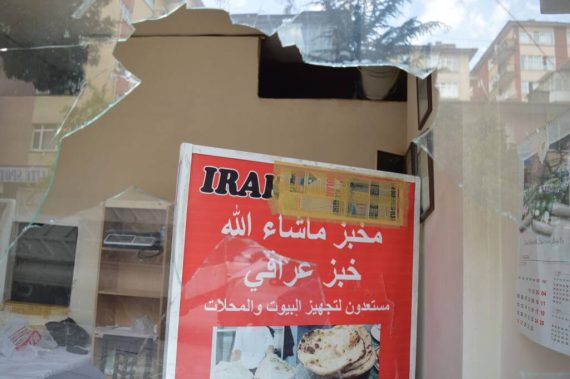In the run up to the local elections to be held on March 31, anti-refugee rhetoric targeting Syrian refugees have started to appear in campaign speeches – a pattern that has been repeating itself since 2015. Some political leaders and party representatives have once again brought up the “Syrian” rhetoric in a negative way. An aggressive atmosphere for election campaigns can be regarded as a political convention. In democratic countries, it is only natural to observe a certain degree of tension. This goes for all democratic countries. But insisting on similar arguments in every electoral period shows that some limits may have been overstepped.
The exclusionist discourse adopted by the representatives of the main opposition, the Republican People’s Party (CHP) and the Iyi Party, does not only overstep the limits of political ethics, but also demonstrates that these parties violate fundamental principles and humanitarian aspects such as charity, justice, human rights, and the right to live. Despite that, the effort to consolidate the electorate by making use of the issue of Syrian refugees has turned into a manipulative tool for the members of these two parties.
Social provocation and Syrian refugees
The Iyi Party and CHP have bad records with regard to spreading anti-refugee sentiment that has lately come into prominence ahead of the local elections. Politicians from both parties have been engaging in activities that contribute to the production and circulation of discourses that aim to manipulate society. There are numerous examples of this. But it would be more than enough to just remind a few of the most provocative incidents, which were generally fomented by those who are antagonistic to the Turkish President Erdogan. For instance, in January 2017, Ozturk Yilmaz, CHP deputy chair responsible for foreign policy, issued a statement to spur anti-refugee sentiments in public by stating that Syrian men were hanging out with Turkish girls while Turkish troops were fighting and dying in al-Bab. This mindset was subsequently spread in the political spectrum spearheaded by the CHP and Iyi Party. Similarly, Muharrem Ince, CHP’s presidential candidate for the elections that took place on 24 June, 2018, said that the Syrian refugees who went to their hometown to celebrate religious holidays should not be allowed to Turkey on their return.
The anti-refugee discourse adopted by the CHP and Iyi Party does not only overstep the limits of political ethics, but also demonstrates that these parties violate fundamental principles and humanitarian aspects such as charity, justice, human rights, and the right to live.
There are a series of baseless biases on Syrian refugees, which are incessantly repeated by certain groups as if they are true. Some of the most common biases are often phrased as: “Everything is free of charge for Syrians, since our citizens pay for everything,” “Syrian students are accepted into universities without taking any exams,” “TOKI (Turkey’s public housing body) gives Syrians houses free of charge,” “Their phone bills are paid by the state,” “The state puts Syrians on a payroll,” and “Syrians do not work or produce anything. They are only a burden for our economy.” Although relevant state institutions have issued many statements expressing the inaccuracy of these claims, such rumors are still widespread in public.
The approaches of the opposition party chairs also reflect the same rigidity, which indicates that the opposition has lost its common sense on the political ground. For instance, CHP Chair Kemal Kilicdaroglu issued many statements promising that he would send Syrians “back home.” In a speech he made in Gaziantep in April 2017, Kilicdaroglu argued that the state shows greater care to Syrians than its own citizens, he constructed a polarizing political language by using the refugee issue and claimed that refugees are loitering in Turkey while Turkish troops are being killed in al-Bab.
The same goes for Iyi Party Chair Meral Aksener. Prior to the June 24 elections, Aksener promised to send Syrians back to their country during her presidential campaign. This was most probably employed as a strategic tactic. Aksener touched on the subject in many of her speeches and repeatedly promised to send all Syrians back to their country before the month of Ramadan in 2019. Consequently, considering the present conditions of the Syrian Civil War, it is not hard to imagine how such a scenario would trigger a lurid carnage.
As Turkey is approaching the March 31 elections, the same discourse is re-appearing and being re-employed. Within this context, the statement made by Hatay Metropolitan Municipality Mayor and CHP member Lutfu Savas on January 17 that, “If a Syrian refugee was to come forward as a candidate in the local elections in the districts of Reyhanli, Yayladagi, Altinozu, they’d certainly win,” shows that this constitutes the continuation of previous approaches. These can be interpreted as obvious attempts by political actors to consolidate their public bases by fueling anti-refugee sentiment.
Upon examination of the mentioned examples, there are strong indications that the anti-refugee sentiment is turning into xenophobia and in some dimensions carries similarities with far-right movements of Europe. The ostracizing attitudes of racists in Europe towards Turks and other Muslims are trying to be implemented in Turkey. Another point that should be stressed here is that the attitudes of the two parties regarding the subject of refugees is not focused on developing solutions. Aside from the suggestions that “Syrians should leave” and that there should be a reconciliation with the Assad regime “immediately,” the CHP and Iyi Party do not have any healthy suggestions in such a wide field.
There are strong indications that the CHP and Iyi Party’s anti-refugee sentiment is turning into xenophobia and in some dimensions carries similarities with far-right movements of Europe.
The opposition’s contradiction regarding Syrian refugees
Recommended
When examining the discourse employed by Turkish political parties that are trying to use the matter of Syrian refugees living in Turkey as a propaganda tool for the upcoming elections, a great contradiction can be observed. In order to deal with this problem, which has its roots in Syria, the Turkish administration under the leadership of President Erdogan, is engaging in intense diplomatic efforts both with global powers such as the U.S. and Russia and with regional powers such as Iran. Within this context, the Astana peace process, initiated with Russia and Iran, has come to a significant point. They are also negotiating with the U.S. in regards to the territory held by the YPG-PYD in the west of the Euphrates, as well as the presence of the terrorist organization in the regions east of the Euphrates.
President Trump’s announcement of the withdrawal of the U.S. from Syria, as well as following announcements regarding the establishment of a “safe zone,” which is in accordance with Turkey’s intentions in the region, show that these negotiations have yielded, and are likely to continue to yield, positive results. Undoubtedly, there are many unknown variables in the process. Due to this reason, delicate diplomatic efforts are being made as part of a long and arduous process.
In addition to these political processes, Turkey has also displayed its hard power capabilities with its military operations. Firstly, in 2016, Operation Euphrates Shield was conducted against Daesh. Following, in 2018, Operation Olive Branch was conducted in Afrin against the terrorist organizations YPG/PYD and Daesh. These two military operations yielded important results in terms of ensuring the territorial integrity of Syria with the removal of terrorist organizations, the destruction of groups threatening Turkey’s national security, and the safe return of refugees to Syria. President Erdogan frequently expresses to the global public that in the following period, Turkey will continue to shape its Syria policy with similar intentions. The fact that over 300 thousand Syrian refugees have been able to return to their homes as a result of these operations is important in understanding the political codes awaiting us.
In this context, the contradiction revealed is as follows: Even though authorities from the CHP and Iyi Party have established their campaigns around Syrian refugees, they have always opposed such measures and processes that allow for the safe return of Syria refugees. While the AK Party is making efforts to both protect Turkey’s interests in the region and to ensure the safe return of refugees to their countries, the fact that political movements expressing discontent towards the heavy presence of Syrian refugees in Turkey oppose such efforts shows an important paradox in their attitudes. As a result, it can be concluded that the perspective of these two parties regarding the refugee matter is not focused on finding solutions, but rather focused on using the issue for their own interests in domestic politics.
Even though the CHP and Iyi Party argue for the return of Syrian refugees in their campaigns, they always oppose measures and processes that allow for the safe return of refugees to Syria.
Two main reasons lie behind this discourse. The first is the effort to corner the AK Party and Recep Tayyip Erdogan, as they were in power during the period in which Syrians fled the war and sought refuge in Turkey. The second has to do with the electoral base of the political parties that are trying to keep this propaganda tool alive. The political spheres that produce, attempt to spread and employ this discourse are seeking to motivate their public bases. It should be emphasized that this discourse, which has been built on natural problems that exist in the societal foundation within the context of Syrian refugees, is brought in certain communities.
Shifting to the far right?
So, how many Syrian refugees are currently residing in Turkey and how many of them have the right to vote? These numbers are shared with the public. According to Turkey’s Interior Minister, Suleyman Soylu, the number of Syrian refugees currently living in Turkey is around 3 million 630 thousand. The total number of those that have been naturalized is 73,820. Subtracting this number from those that are below the voting age, 53,990 people remain. Meaning that only 53,990 Syrian refugees will be able to vote in the upcoming local elections. Considering that Syrians that are eligible to vote live in different cities across Turkey, they do not have the capability to heavily influence any region and do not have the ability to change the results of the vote. Due to this reason, campaign strategies that start by putting emphasis on “Syrians” lack any real basis.
Looking at the elections held in Turkey since 2015, all four of them resulted with the victory of the AK Party. While the AK Party failed to receive the majority in the general elections of June 7, 2015, it received 49% of the total votes in the elections held on November 1, 2015, and formed the government. Again, in the constitutional referendum held on April 16, 2017, the proposal brought forward by the AK Party and the Nationalist Movement Party (MHP) was accepted and in the following presidential elections held on June 24, 2018, Erdogan was elected as the President of Turkey. The People’s Alliance founded by the AK Party and the MHP also achieved an overwhelming victory against the Nation Alliance, which employed a similar discourse in the campaign trail.
Insistence on igniting anti-refugee sentiment for simply gaining more votes pushes society towards the political right. And this will not benefit anyone in the long-term.
The language of propaganda that aims to incite anti-refugee sentiment does not have the capability to change the voting habits of the public in Turkey. It can be foreseen that the decision of political actors to employ this discourse, despite having experienced the above stated fact in the previous four elections already, will not do them much good. The only result that will be produced by their insistence on this point is within the context of an ideological shift in their public bases, pushing them more towards the right. And it is obvious that this will not benefit anyone in the long-term.





